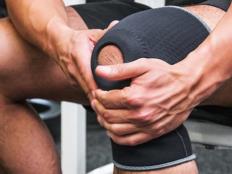Strength's Edge: A big question mark. Scientists note promising results on the mood-altering effects of pumping iron. But more research is needed to nail the intensity and duration necessary to match cardio's benefits.
Winner: Cardio
To Stay off the Sidelines
Cardio's Edge: The repetitive nature of cardio puts serious pressure on your joints, ligaments, muscles, tendons—and the cartilage in between. If you've got a weak link, you're screaming to be benched. That is, unless you hit the weight room.
Strength's Edge: In a 2006 study in the American Journal of Sports Medicine, researchers found that a balance-training program—think single-leg squats and anything on a wobble board—reduced the risk of ankle sprains in athletes. "Functional strength training teaches your brain to allow muscle contractions that are quick enough to prevent or minimize injuries," says lead study author Tim McGuine, Ph.D., senior athletic trainer and research coordinator at the University of Wisconsin-Madison. Your best bet: Choose moves that work your core, improve your balance, and force you to bend at multiple joints—so lunges, rows, squats and presses are all fair game.
More: 30-Day Lunge Challenge
Winner: Strength
The Best Way to Reduce Post-Workout Soreness
To Add Years to Your Life
Cardio's Edge: There are more health perks in cardio's corner than Kabbalah bracelets in Hollywood. "Nothing compares with cardio for optimizing longevity," says Mike Meyers, Ph.D., an American College of Sports Medicine—certified trainer and director of the Human Performance Research Laboratory at West Texas A&M University. "It reduces the risk of obesity, heart disease, high blood pressure, type 2 diabetes, osteoporosis, stroke and even certain types of cancer." The ticker-strengthening benefits are especially sweet: A stronger heart pumps more blood with each beat, circulating oxygen more efficiently throughout your body; aerobic activity prevents inflammation around your heart; and lacing up your sneaks can increase the "good" cholesterol in your blood by up to 8 percent in just eight weeks, according to a 2007 study published in the Journal of Internal Medicine.
Strength's Edge: A 2006 study by the National Institutes of Health found that lifting weights just twice a week can prevent you from gaining intra-abdominal fat—the kind that wraps around organs and constricts blood vessels.
Winner: Cardio
- 2
- of
- 3
Get ACTIVE on the Go


Couch to 5K®
The best way to get new runners off the couch and across the finish line of their first 5K.
Available for iOS | Android






Discuss This Article